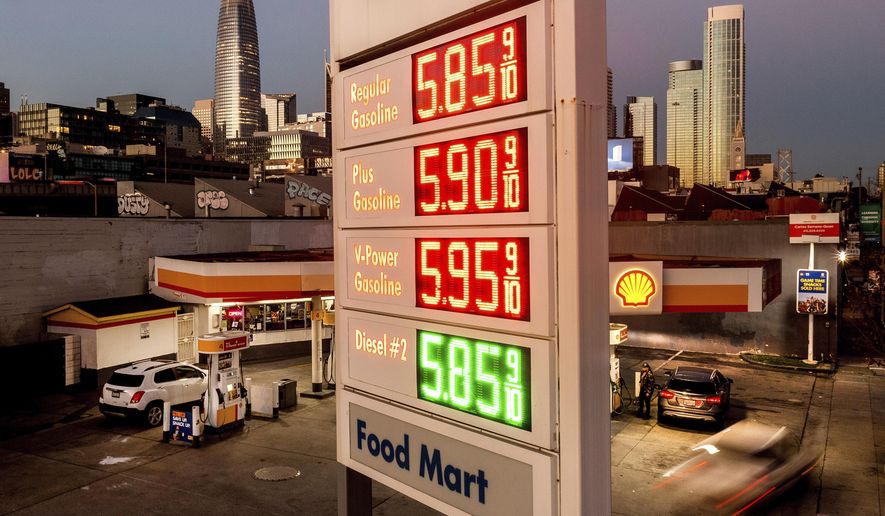President Biden’s crackdown on the oil-and-gas industry is driving soaring energy prices, and Build Back Better will only push costs higher, according to the American Petroleum Institute.
In his 2022 State of American Energy address Wednesday, API President Mike Sommers said the U.S. position is strong, but that “we begin 2022 with Americans viewing energy and its cost as major concerns.”
“This is in part because lately, we’ve seen policies aimed at restricting production and delivery of U.S. natural gas and oil,” Mr. Sommers said in the virtual event hosted by the nation’s leading oil-and-gas advocacy group.
He cited President Biden’s day-one cancellation of the Keystone XL pipeline, the administration’s leasing moratorium on federal lands and delays over infrastructure improvements, such as the battle over replacing the Enbridge Line 5 pipeline in Michigan.
“Meanwhile, with inflation soaring to historic levels, we’ve seen proposals in Congress for a targeted tax increase for natural gas, and even further restrictions on American energy development,” Mr. Sommers said. “These decisions exacerbate Americans’ concerns and put upward pressure on their energy prices.”
Build Back Better, the Democrats’ $2 trillion climate and social spending bill, includes fees on methane emissions that the industry says will ultimately hit consumers in their pocketbooks.
The measure passed the House in November but remains stalled in the Senate after Sen. Joe Manchin III, West Virginia Democrat and a key swing vote, said last month he could not support it.
“Natural gas prices are going up because we’re in the middle of a cold winter, and there have been restrictions on supply that have come as a consequence of some of the policy decisions that have been made by this administration,” Mr. Sommers said. “We’re focused on reversing those policy decisions but at the same time, we have to stop this natural gas tax because that would just mean higher prices for American consumers.”
“U.S. policies that restrict domestic production force our country to seek relief from OPEC, undermining our energy independence.” – API’s @mj_sommers #SOAE2022
— American Petroleum Institute (@APIenergy) January 12, 2022
The API’s message came with the Biden administration’s ambitious climate change agenda facing political headwinds over higher prices and the pump and the thermostat.
The U.S. Energy Information Administration forecast that U.S. homes using natural gas will spend 30% more on heating in the 2021-22 winter, while those heated with electricity will spend 6% more, following “changes to energy supply and demand patterns in response to the COVID-19 pandemic.”
The national average cost for a gallon of regular gasoline on Wednesday was $3.30, an increase of $1.01 from the same date last year, according to the AAA.
Crude oil approached $80 per barrel this week, fueled in part by production cuts in Kazakhstan, an OPEC+ country grappling with social unrest.
The U.S. is the world’s leading oil-producing country, but policies aimed at curtailing production will inevitably result in “consequences,” Mr. Sommers said.
“U.S. policies that restrict domestic production force our country to seek relief from OPEC, undermining our energy independence,” he said. “America should not be in the position of asking for foreign energy supplies, especially when we have abundant resources produced to standards that are among the highest in the world right here at home.”
In August, the Biden administration asked the OPEC nations to pump more oil to bring down skyrocketing fuel prices, a request OPEC and its oil-producing allies rebuffed, prompting industry officials to counter that he should instead encourage U.S. production.
Mr. Biden, who released 50 million barrels of oil from the Strategic Petroleum Reserve in November, has characterized the soaring gas prices as temporary as the nation transitions away from fossil fuels.
“It will take time, but before long, you should see the price of gas drop where you fill up your tank,” he said in Nov. 23 remarks. “And in the longer term, we will reduce our reliance on oil as we shift to clean energy.”
• Valerie Richardson can be reached at vrichardson@washingtontimes.com.




Please read our comment policy before commenting.